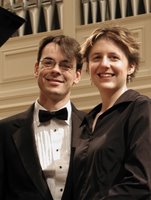
Roger Lowther has a Master of Music in Organ Performance from The Juilliard School of Music in NYC, and his wife Abi has a Master of Music in Piano Performance from the University of Memphis. These accomplished musicians have an unusual passion for using their gifts and abilities to share the gospel with Japanese. Lowthers arrived in Japan in 2005 and are career missionaries with MTW (Mission to the World); they are currently studying Japanese language and culture.
Roger has recorded three CDs: “Lowther plays…” “Come Away to the Skies,” & “Storytime: Night on Bald Mountain.” A new CD entitled “Storytime: Mars & Venus,” featuring Roger on the pipe organ and Abi on the piano, will be released in 2006.
Quotes:
"World evangelism is way beyond our resources. But, God continuously takes five loaves and two fish and turns them into enough, plus extra… so that His name is glorified in our hearts, and His kingdom is spread throughout the world.” Abi Lowther
“Talking about Christianity through the arts is a great approach in Japan because it is indirect. Rather than sharing our own viewpoint, we can talk about Christianity through the perspectives of well-respected people like Bach or Van Gogh." Roger Lowther
INTERVIEW
Q. How will you utilize the arts to reach Japanese for Christ?
Roger: Many stories (written by a Christian or not!) contain the Christian themes of light shining into darkness, life coming from death, victory coming from defeat, strength coming from weakness, and rescue beyond all hope. They continue to be written into movies, books, paintings, and all kinds of media because they are deeply ingrained into the very substance of creation. The human heart of any culture longs for these themes, and through them, we can point people to the gospel of hope and grace.
Q. Explain more about how you will “point people to the gospel.”
Roger: One of the main ways is through concerts that we will perform or invite others to perform. Though our training is classical, our concerts will not be limited to classical music. In fact, Abi led a black gospel choir to Japan from Memphis a year ago. We will also share the gospel through lectures on musicals (“Les Misérables: Living with grace”), movies (“The Lord of the Rings: Just a good story?”), symphonies (“Mahler 2: A symphony of hope through death”), and other arts, including novels, plays, poems, paintings, dance, manga, anime, and even kabuki. The lectures are kept short to encourage lengthy discussion times afterward. I probably learn more in the discussions than the audience learns in the lectures. (He laughs)
Q. What kinds of things do you learn?
Roger: I get to know people and the way they think, what questions they are asking, what they think about the world around them, and, if they’re artists, what they are saying through their art. In this way, and through reading, I get to know the culture.
Q. How do you think Christians should relate to mainstream culture?
Abi: I’d like to answer this one. We should definitely be involved and be part of it. We should also be able to respond to it, and yet in our response not be preachy. The fear of being polluted by the world is legitimate, because we are all human, but it is not an excuse to stay away from mainstream culture and art. It is our responsibility to go and live with the people as Jesus lived with us. Because of this, we like organizing events where non-Christians can get to know Christians and where Christians can grow by learning to talk about life’s issues from their Christian perspective.
Q. Why Japan?
Abi: Japan seems to be the perfect match for us, something that becomes clearer every day. The arts are perhaps appreciated more here than in many countries of the world. It is an amazing culture, full of beauty – and that is what we LOVE to talk about, like putting us in a candy store. In addition, because of their high literacy, Japanese are perhaps more interested in hearing the gospel through the high arts than any people in the world. We hope Japanese artists will catch this vision for portraying the gospel through what they do and reach their own people as well as contribute to the church.
Q. Will you be available for concerts?
Abi: Yes, but our time and energy will primarily be committed to our church planting team in Chiba lead by Dan Iverson. We plan to live somewhere in Chiba after language school but we hope to build relationships with artists (both Christian and non-Christian) throughout Tokyo.
Q. Who or what has influenced your thinking about God, the Bible, and the arts?
Roger: I attended Redeemer Presbyterian Church in New York City for six years. The senior pastor, Dr. Timothy Keller, greatly influenced my teaching style and content, especially through his “Open Forums” (concert/discussions for non-Christians designed to tackle themes like love, death, money and freedom, from a Christian perspective).
Also, my wife and I stayed at L’Abri in England for 1 month. Founded by Francis Schaeffer to talk about Christianity from all aspects of human life and culture, we learned a lot about how to lead healthy discussions in a non-Christian environment, especially about movies and books.
This may sound funny, but we were greatly influenced by the Pacific Crest Trail (PCT). It is a 2659-mile trail, running from Mexico to Canada through California, Oregon, and Washington. Hiking the full length of this for six months influenced the way we think about Christianity and art. It is hard to explain, but it has given us the freedom to be more creative and have a larger perspective of our place in this world as Christians.
Contact information:
Roger and Abi Lowther
1190-16 Karuizawa Machi
Kita Saku Gun, Nagano Ken 389-0102
Phone: 0267-42-8647
E-mail: rogerlowther@gmail.com
